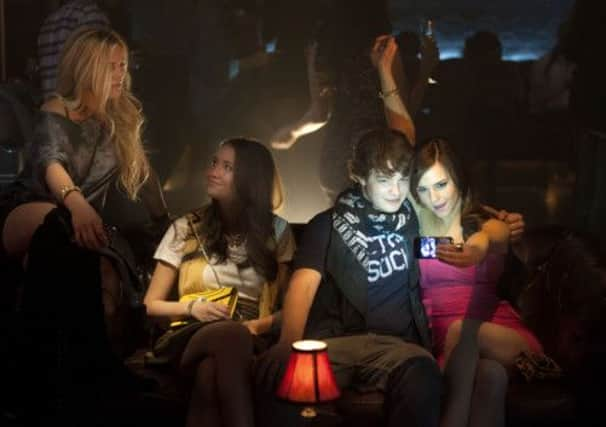Film review: The Bling Ring (15)


THE BLING RING (15)
Directed by: Sofia Coppola
Starring: Emma Watson, Katie Chang, Israel Broussard, Leslie Mann, Gavin Rossdale
Star rating: * *
Does a vacuous film about a vacuous culture qualify as a valid artistic statement? That’s the main question Sofia Coppola’s The Bling Ring raises. Too bad the answer is a big fat “no.” Drawn from a 2010 Vanity Fair article by Nancy Jo Sales, this based-on-true-events drama about a group of celebrity obsessed teens getting their kicks from robbing the red carpet set feels like a half-hearted anthropological study in narcissism from someone determined to distance herself from her own complicity in the world she’s observing.
Advertisement
Hide AdThere’s no critique, for instance, of the luxury brand culture that Coppola – in her occasional roles as a designer, model and commercials director for the likes of Louis Vuitton, Marc Jacobs and Christian Dior – has helped perpetuate, nor is there any real desire to get under the skin of the almost pathologically covetous Los Angeles-dwelling kids who have convinced themselves that living this lifestyle is as much their birthright as it was hers.
What emerges in place of such things is a slightly sneery portrait of the kind of déclassé celebutant culture that has devalued the exclusivity of fame – made by a film-maker who clearly thinks she’s above such things because she grew up in a world where stars meant Al Pacino and Marlon Brando not Paris Hilton and Lindsay Lohan.
In this respect, the details of the real story do gift Coppola with a perfect symbol for this transition. The upper middle-class teens who ransacked the mansions of Hilton and other third rate stars like Orlando Bloom and Rachel Bilson in a brief crime spree that netted them luxury goods worth almost $3 million, did so with relative ease because their pampered targets had a tendency to either leave the keys to their homes under the mat or leave a window or a side entrance unlocked when they were out of town or attending a premiere.
In other words, they literally left the door open for anyone with enough gumption to breach the last gilded sanctuary of the so-called celebrity class. Their inattention to this basic them-and-us rule of VIP culture is a crime that Coppola punishes by pettily revelling in the way her characters zero in on their targets by tracking their movements on intrusive entertainment news websites.
Being a “victim” of this group, the film seems to be suggesting (albeit not very forcefully), is a sign that someone doesn’t deserve to be a star, which is an idea that could have been developed into a savage and vicious exposé of the different tiers of celebrity culture had Coppola been willing to attack the subject with any bite.
Alas, the most she expresses through her film is mild annoyance and the extent to which she pussyfoots around the issue is perhaps reflected in Paris Hilton’s willingness to allow Coppola access to her actual home to shoot the film. What’s rather more disheartening is the The Bling Ring’s disinterest in the subculture to which its protagonists belong. Hanging around the same hipster clubs frequented by Hollywood stars such as Kirsten Dunst, shopping with stolen credit cards in designer boutiques, and depressed about not being attractive in an “A-list way”, they’re representative of a new breed of dysfunctional kids who have grown up rich but not wealthy in an era where self-belief has become its own religion.
Advertisement
Hide AdWhatever insights the film gleans comes not through marvellously nuanced performances, cleverly juxtaposed imagery or an irony laced screenplay, but from Coppola’s decision to structure the film around the writing of the article that inspired it.
Thus dreamy but detached shots of the robbers’ various escapades are interspersed with scenes depicting a reporter interviewing those involved about their crimes and motivations, allowing Coppola to have her actors simply quote directly from the excellent Vanity Fair piece instead of finding interesting ways to dramatise it.
Advertisement
Hide AdIt’s a lazy and boring approach, not least because in lieu of any genuine satirical edge it just reduces the characters to one-dimensional monstrosities. There’s certainly none of the artistic daring of Harmony Korine’s similarly themed Spring Breakers. Indeed, this could more accurately be described as Spring Fakers, such is its posturing nature.
Emma Watson’s presence as the gang’s most delusional member certainly doesn’t help. Heading up a cast of relative unknowns, the Harry Potter star’s status as one of the wealthiest and most famous actors on the planet destroys the film’s internal reality from the off, especially since she hasn’t yet acquired the skills to disappear into a role (or – judging from her cameo in last week’s This is the End – even convincingly play herself).
But it’s really Coppola’s increasing limitations as a film-maker that are most evident here. After examining fame’s bubble-like existence in the wondrous Lost in Translation, the interesting Marie Antoinette and the vapid Somewhere, The Bling Ring sees her going round in ever decreasing circles.